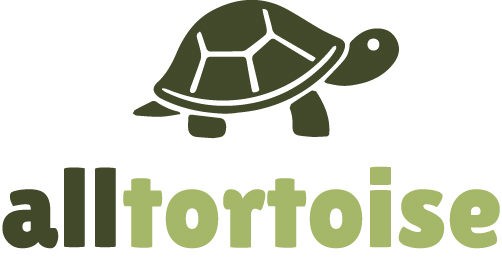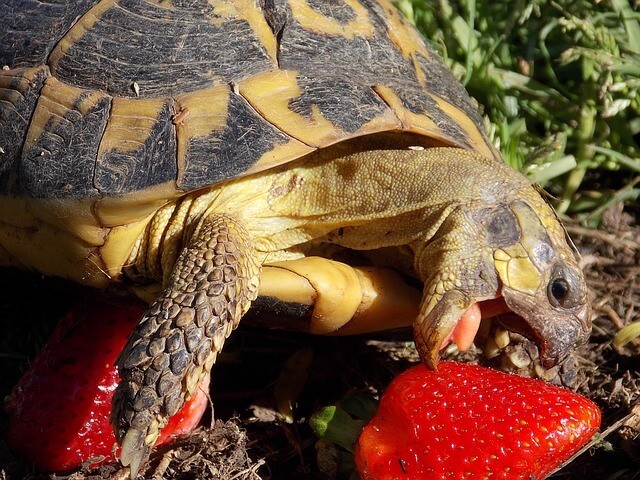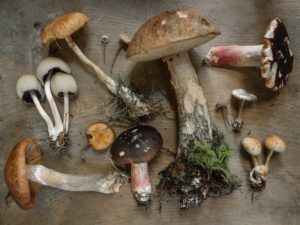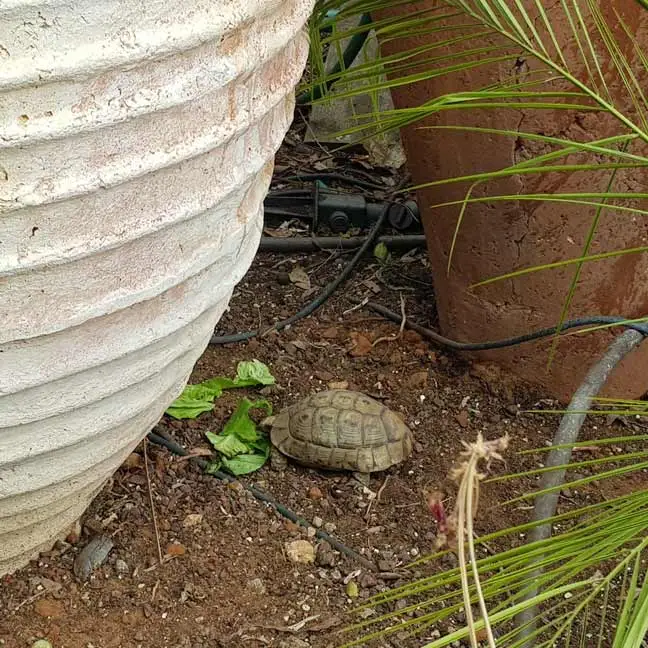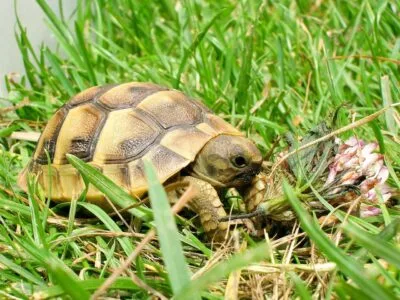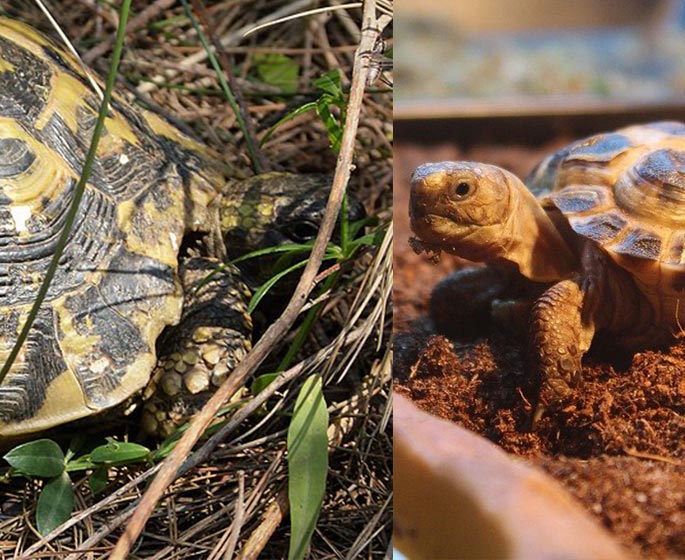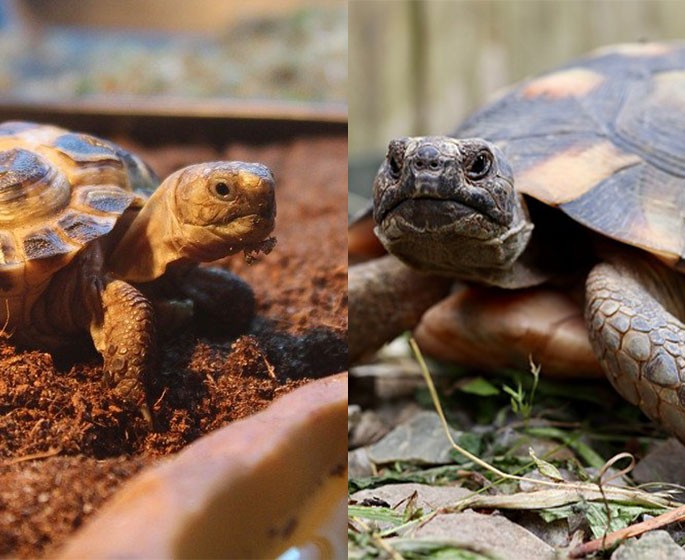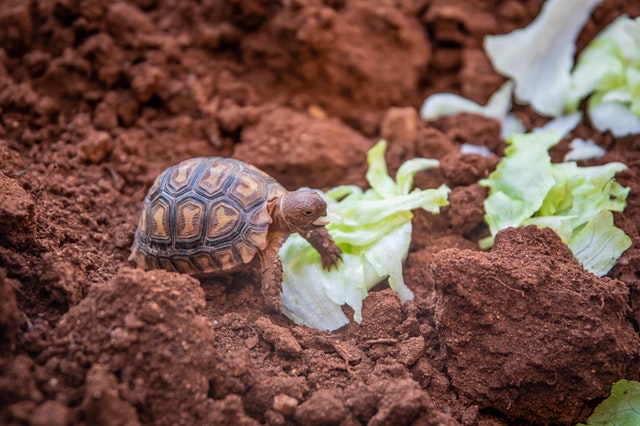Diet is one of the most critical aspects when caring for Russian tortoises. Providing them with the right food is a quick and straightforward task. They need a diet that is low in protein and high in fiber.
This tortoise species prefers flowers, succulents, weeds, vegetables, with an occasional shrub and herb. Weeds include salsify, bergamot, stinging nettle, timothy hay, clover, a few amounts of young dandelion, and others. Tasty flowers include pansy, viola, livingstone daisy, echeveria, cornflower leaves, coreopsis, roses, and marigold.
Bay, sweet woodruff, wild marjoram, sage, thyme, and rosemary are all safe herbs; however, your tortoise may find them less interesting. Mulberry leaves are an excellent option in the shrub category. Since Russian tortoises are desert animals, they also enjoy succulents, like prickly pear, aptenia, aloe vera, and sedum. Since succulents come with a laxative effect, feeding them a small amount goes a long way.
While Russian tortoises are enthusiastic eaters, not all foods are good. Keep reading to get familiar with the foods you should avoid when feeding a Russian tortoise. Plus, you will also discover the right food for them.
So, let’s start!
Foods to Avoid When Feeding Your Russian Tortoise
Russian tortoises often avoid eating items that can harm them when free-ranging in their habitat or garden. However, it is critical not to offer them harmful food items when you feed them indoors.
Don’t you worry, your tortoise can make up on his own what to eat and what not. But keep in mind that these foods can harm your tortoise.
Here are the five things you should not give your Russian tortoise:
Particular Vegetables
While vegetables are a critical part of the Russian tortoise’s diet due to their nutritional value, some vegetables are not suitable for them. They include asparagus, spinach, and beetroot.
About 90% of the Russian tortoise’s diet is comprised of vegetables, but some vegetables are only served in a severely limited amount. They include sweet potato, potato, rhubarb, chili pepper, bell pepper, and zucchini.
The main reason you should keep those vegetables off your Russian tortoise is their higher sugar content and carbohydrates. If you feed them with those items in high concentrations, it leads to liver failure, obesity, or nutritional deficiency.
Mushrooms
While a plate of mushrooms or mixing them in various dishes can be delicious for humans, they are ill-advised for Russian tortoises. Letting them consume this food could be fatal to your tortoise. They are not only difficult to digest but also present a possibility of being poisonous.
Specific Fruits

Just like vegetables, fruits are also a critical aspect of a Russian tortoise’s diet. However, you should limit the amount your tortoise eats. Fruits must be only around 10 percent of your tortoise’s total food consumption. That is because fruits contain high sugar content, leading to significant damage over time.
Not all fruits must be consumed by your Russian tortoise, including nectarine, apricot, pomegranate, kiwi, peach, grapes, dates, and banana. Some people are curious whether the Russian tortoise can eat berries. Raspberries, strawberries, and other berries are delicious treats that can be part of their diet. On the other hand, since they are sweet, you should only give them berries on rare occasions.
Sugar
No matter the circumstance, you should never give your Russian any food with high-sugar content. This item will not only minimize the amount of fruit in their diet but also can cause severe damage to their internal organs. Keep in mind that any added sugar, colors, or preservatives are dangerous to their health.
Due to the bacteria in the tortoise’s digestive tract, you should not offer them sugar. Their intestinal flora may be capable of digesting small amounts of sugar, but too much can result in death. So, be extra careful when it comes to sugar content.
Cat Food and Dog Food
In some cases, people supplement their tortoises’ diet with cat or dog food. While red-foot tortoises and other species may consume those items because they need some protein, it is still a mistake. So, never give your Russian tortoise that kind of food.
While you can give them dry food in small doses, cat food or dog food has nutritional values not created for Russian tortoises. Particular additives, minerals, fat content, and vitamins from those foods can significantly harm your tortoise. The result can be dietary problems or nutritional deficiency.
Another reason why you should not give your tortoise cat or dog food is they contain animal products. As mentioned above, protein can harm your tortoise. So, it is best to avoid them.
Where to Get Foods for Russian Tortoise?
Russian tortoises may be among the most common pet tortoises in the world, but there is a bit more known about their diet. These tortoises graze on succulents, stems, and grasses when they are in their natural habitat.
The good news is that you can easily replicate that habitat in your home. You can grow fresh organic food for your Russian tortoise in containers or outdoors. Most tortoise-friendly foods are grown nearby in vacant lots and parks.
It is an excellent idea to grow plants within your property if there is enough space. However, your tortoise may ear the plants down to the ground and kill them. The best thing you can do about it is it protects the plant’s base with a cage or put them in a pot.
You can also grow the tortoise’s food in containers next to their habitat. That way, they can easily access the leaves and flowers while the roots and stems remain intact. However, it should not be the sole tortoise’s food source.
You can try organic farmers’ markets to purchase fresh, high-quality food items. Before feeding your Russian tortoise, ensure to thoroughly wash the grocery store vegetables to remove chemical residue and waxes.
Try these seeds of wild lattes and Dandelion. They love them and easy to grow!
How to Feed Russian Tortoises
Use a dish to feed Russian tortoises. Gravel, sand, or soil is unpleasant to their digestive system, which will cause problems in the long run.
Keep in mind that you are feeding small desert reptiles. Let them eat happily for twenty minutes a day. If you want to ensure your Russian tortoise got the right amount of food, it should feel heavy. You also need to keep healthy temperatures for them. If the habitat gets too hot or cold, they tend to eat less due to aestivation or hibernation.
You should get to know their feeding routines. it is important to feed your tortoise with a natural and nonchemical diet. an adult Russian tortoise will need to eat once per day or 5 times a week. some owners leave a dish of vegetables for the toroise to eat whenever he wants.
Warnings When Feeding a Russian Tortoise
While plants are a good food source for Russian tortoises, they contain high oxalic acid, blocking calcium absorption. Spinach, cabbage, dandelion leaves, watercress, escarole, beet greens, kale, celery, parsley, and collards are nutritious, but you have to limit the amount you give to your Russian tortoise.
Never feed your tortoise canned foods because they contain sodium. Frozen foods, dairy products, or bread are also inappropriate to their diet. Foods with over 15 percent protein can cause shell and organ damage.
Remember that food is a vital factor in longevity. So, you have to ensure that the food your tortoise eats is free from hazardous chemicals like weed killer, bug spray, or fertilizer. Other dangers are found in runoff from driveways and roads, such as antifreeze, motor oil, and gas.
Some food hazards produce immediate symptoms and effects, while others progress to dangerous levels in the long run. That is why you should grow or buy organic food whenever possible. Meanwhile, even if the plants you grow are natural, it does necessarily mean they are safe. Russian tortoises often nibble to non-toxic levels or avoid poisonous plants – better safe than sorry.
Toadstools, mistletoe, foxglove, hydrangea, rhubarb, rhododendrons, etc., can bring danger to the reptile. Generally, if those plants grow from a tuber, corm, or bulb, they are best avoided. Plants that grow cones or needles should also be excluded from their Russian tortoise’s diet.
What are the General Rules When Feeding a Russian Tortoise?
Here are the key guidelines when feeding your Russian tortoise, whether you are a first-time owner or not:
- Buy plants and vegetables that are grown without chemicals;
- Commercially grown fruits have more sugar content than their organic counterparts, so it is best to keep fruit consumption to a minimum;
- If you are unsure about the plants’ identification in your garden, you can ask an expert or do not give them to your tortoise at all;
- Mix plants up a bit. Tortoises can eat different plant species in the wild, so it is great to provide them with a little variety;
- Remove uneaten food items at the end of the day and do not forget to provide them with fresh, clean water the following morning;
- Feeding your Russian tortoise is more than just keeping them at a healthy weight; you also need to consider their hydration, beak management, and shell growth.
Final Thoughts
While getting a Russian tortoise as a pet is exciting, you need to consider several things to become a responsible owner and ensure their overall health and happiness. Besides providing them with the proper habitat, you also need to determine the suitable food for their diet. Not all plants and food items are good for them, so ensure to know and avoid foods that can harm them.
